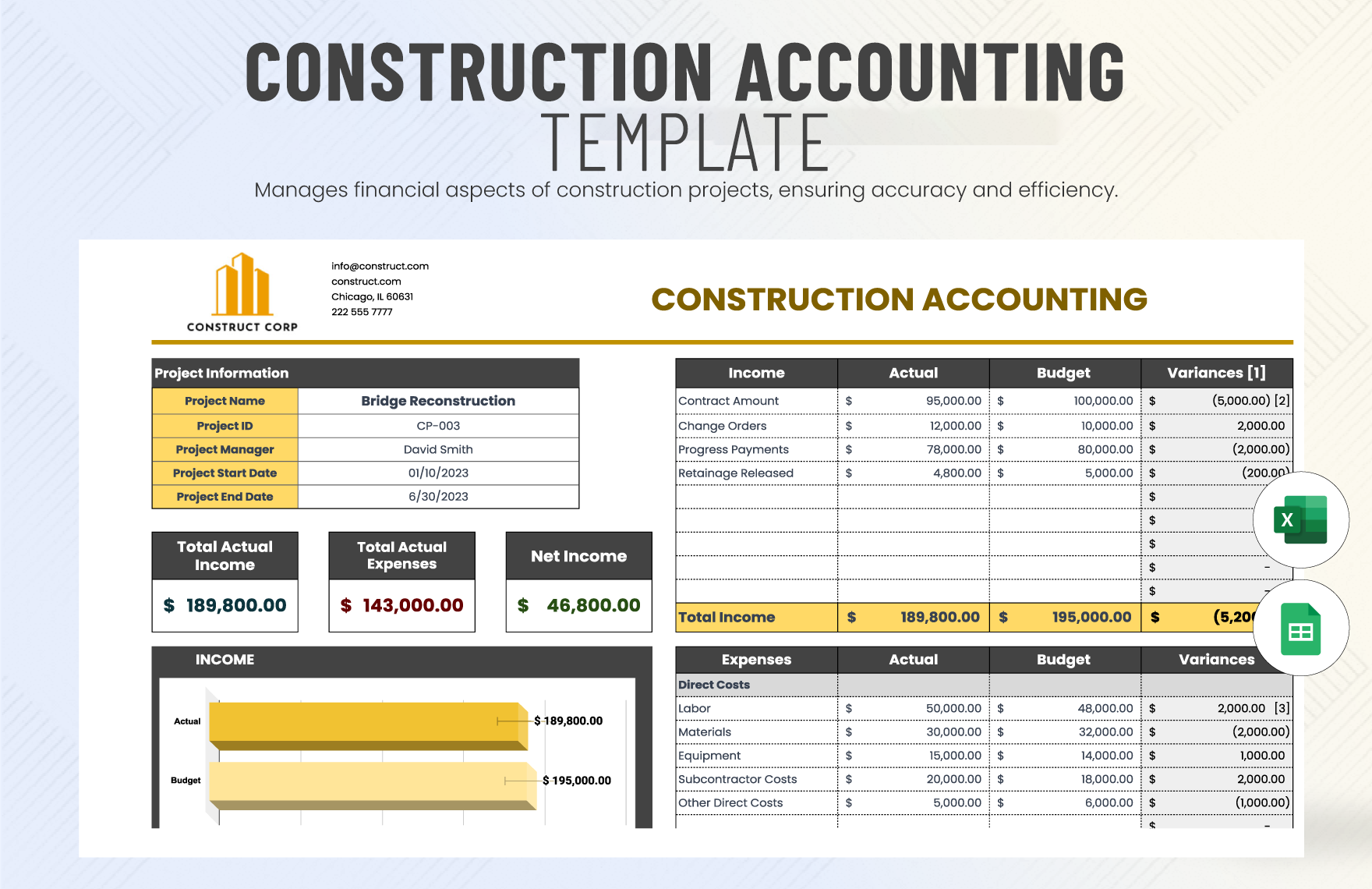Successful Construction Projects Start with Proper Construction Accounting Practices
Successful Construction Projects Start with Proper Construction Accounting Practices
Blog Article
Recognizing the Importance of Construction Bookkeeping for Successful Project Management

Duty of Building And Construction Bookkeeping
Construction accountancy functions as the foundation of monetary management in the building and construction market, making certain that jobs are completed within spending plan and financial goals are met. construction accounting. This specialized accountancy approach addresses the unique obstacles dealt with in building projects, including differing job durations, rising and fall costs, and multiple stakeholders
One of the main roles of building accounting is to offer precise expense estimation and tracking throughout the project lifecycle. This helps with enlightened decision-making, enabling project managers to adjust timelines and sources successfully. Furthermore, building audit improves capital management by keeping an eye on accounts receivable and payable, thus guaranteeing that funds are available for prompt payments to subcontractors and providers.
It furnishes job supervisors with the essential monetary data to prepare comprehensive economic statements, which are necessary for audits and monetary reviews. Eventually, the role of building and construction accounting expands beyond simple economic tracking; it is indispensable to tactical preparation and functional efficiency, driving the success of building and construction jobs in a competitive landscape.
Secret Components of Building And Construction Bookkeeping

Budgeting establishes a monetary structure that guides job execution, permitting managers to assign resources efficiently and prepare for possible financial obstacles. Accurate cost monitoring is essential for tracking expenses in real-time, assisting to recognize variations in between predicted and real prices. This enables timely adjustments to keep the project on budget.
In addition, economic reporting gives stakeholders with a clear image of the project's financial wellness. Regular records, such as profit and loss declarations and capital evaluations, help with educated decision-making and improve openness among all events involved.
In addition, conformity with sector policies and accountancy standards is essential. This guarantees that monetary practices are not just effective but likewise legal, securing the company against lawful consequences. By integrating these crucial elements, construction bookkeeping fosters an organized strategy to taking care of funds, inevitably adding to the successful completion of building and construction projects.
Advantages for Task Supervisors
Leveraging effective building and construction accounting techniques provides job supervisors with a wide variety of benefits that improve both functional efficiency and economic oversight. One substantial benefit is improved budget plan administration. Accurate tracking of expenditures and incomes permits project managers to keep track of monetary efficiency in actual time, guaranteeing jobs continue to be within budget plan and facilitating timely changes when necessary.
Moreover, building accountancy improves capital monitoring, enabling project managers to prepare for economic demands and optimize source allowance. By comprehending money inflows and discharges, they can better take care of settlements to workers, subcontractors, and suppliers, therefore avoiding expensive delays.
Additionally, durable audit systems give thorough reporting capabilities. Project supervisors can generate reports that offer insights right into job productivity, price differences, and resource application. This data-driven method promotes educated decision-making, allowing managers to determine potential concerns proactively and apply rehabilitative measures.
Lastly, adherence to building and construction audit criteria ensures compliance with governing and lawful requirements, lessening the risk of charges or conflicts. Overall, efficient building and construction audit gears up task managers with the devices necessary to drive job success, improve stakeholder confidence, and advertise lasting organizational development.
Common Difficulties in Building Accounting
Numerous project managers run into significant difficulties in construction bookkeeping that can prevent job success. One of the primary obstacles is the intricacy of tracking several task sites, each with unique budgets, timelines, and resource allocations. This requires meticulous focus to detail, which can be frustrating without a durable accounting system in location.
Furthermore, fluctuating material costs and labor prices can make complex budget plan monitoring, making special info exact forecasting hard. Job supervisors frequently battle to reconcile these expenses with actual expenditures, resulting in possible monetary disparities.
Moreover, building accountancy involves compliance with numerous guidelines, including tax obligations and labor laws. Navigating these regulations can be difficult, specifically for supervisors who may not have a strong accountancy history.
An additional considerable obstacle is taking care of capital, which is essential in the building and construction market. Hold-ups in invoicing, payments from clients, or unforeseen task modifications can create cash flow shortages, jeopardizing the project's progression.
Lastly, reliable interaction between job supervisors, accounting professionals, and field groups is vital. Misunderstandings can cause imprecise economic reporting, further complicating task monitoring efforts. Resolving these obstacles proactively is important for successful construction bookkeeping.

Ideal Practices for Effective Audit
While browsing the intricacies of building accounting can be difficult, adopting best practices can dramatically his comment is here boost economic management and task success. One fundamental practice is preserving precise and timely records. Carrying out durable audit software tailored to construction jobs can streamline data entrance, invoicing, and reporting, conserving and reducing errors time.
Additionally, establishing a clear budget and routine monitoring versus this budget plan are critical. Employing a system of routine financial evaluations permits task supervisors to recognize variances early, helping with timely decision-making. It is additionally important to different task costs into indirect and straight groups, enabling more clear insights into earnings.
One more best method entails cultivating open interaction amongst all stakeholders. Normal updates and collaborative discussions about financial condition can ensure every person is lined up and informed. Educating staff in construction-specific bookkeeping concepts even more boosts proficiency and accuracy.
Finally, making sure compliance with pertinent bookkeeping criteria and policies is non-negotiable. Regular audits and inner evaluations contribute to openness and accountability, developing count on with clients and stakeholders. By focusing on these best practices, building firms can enhance their accountancy processes, eventually driving task success and economic security.
Final Thought
In verdict, building accountancy plays a pivotal duty in guaranteeing successful task management by facilitating accurate economic oversight and boosting decision-making. By incorporating key components such as expense estimate, capital management, and conformity, task managers can browse common obstacles and utilize ideal practices for effective audit. Ultimately, a durable building and construction accounting structure not only safeguards spending plan integrity but additionally contributes to the original site overall economic health of construction jobs, cultivating lasting success within the industry.
By integrating these essential elements, building accounting cultivates an organized approach to taking care of monetary resources, eventually adding to the successful completion of building jobs.
Precise monitoring of costs and revenues enables task supervisors to monitor economic performance in real time, guaranteeing tasks continue to be within spending plan and helping with timely modifications when essential.
Task supervisors can create reports that provide insights right into project productivity, price variations, and source usage.Lots of job managers run into significant obstacles in construction bookkeeping that can prevent job success. construction accounting. Ultimately, a robust construction accounting framework not only safeguards budget honesty however additionally contributes to the general monetary health and wellness of construction jobs, cultivating lasting success within the industry
Report this page